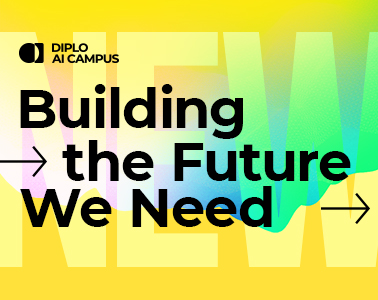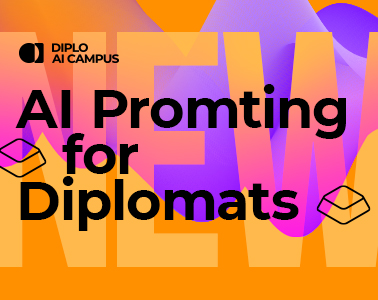

Diplo AI Campus
24 Courses on AI in 2024
Basics | Practice | Diplomacy | Governance | Philosophy
Diplo AI Campus follows our comprehensive humAInism methodology of addressing AI from technological, diplomatic, governance, and philosophical perspectives. Courses are deep in understanding and practical in explaining AI. Teaching is supported by a full grasp of technology and AI tools developed by Diplo’s AI Lab.
Courses are delivered online with the possibility of customised in-situ or hybrid training for diplomatic services and international organisations.
I) BASICS
By following courses in this cluster, you can gain a grasp of the practical functioning of AI. You can learn how AI technology functions and how technological solutions could impact life, governance, and the functioning of society.
1. Under the Bonnet of AI engines
2 weeks | Follow the full cycle of AI training and development | Explain the core concepts of machine learning and neural networks | Clarify core AI terminology
2. Relevance of data, information, and knowledge for AI
2 weeks | Follow the transformation of data and knowledge into AI insights | Discuss the interplay between data, information and knowledge | Analyse data labelling and annotations | Approach bias in data | Explore implications of synthetic data
3. Understanding AI via National Flags: Patterns and Probability
2 weeks | Explain the main functions of AI via UN Member States Flags | Focus on two key concepts of AI: patterns and probability
4. Open-source and proprietary AI
2 weeks | Explain the difference between open source and proprietary AI models | Identify different aspects of the open source approach | Discuss advantages and risks of open source and proprietary AI
II) PRACTICE
This cluster of courses will focus on practical uses of AI, with special emphasis on diplomacy.
5. AI prompting for diplomats
2 weeks | Introduce the concept of AI prompting | Survey good practices in AI prompting | Deliver practical training on AI prompting for diplomats for text, image, and video generation | Compare AI prompting on ChatGPT, Gemini, Claudi and other platforms
6. AI in training and education
2 weeks | Identify pedagogical aspects that can be supported by AI | Explore the integration of AI in teaching processes | Assess the use of AI to foster critical thinking | Unpack the notions of intellectual integrity and plagiarism in the AI era
7. AI apps, platforms and tools
2 weeks | Survey available apps and platforms for writing, reporting, analysis, time management, and other tasks | Cater to practical needs of participants
III) DIPLOMACY
This cluster provides practical knowledge and skills for the use of AI in performing the core diplomatic functions.
8. AI for diplomatic reporting
2 weeks | Analyse the possibility of automating diplomatic reporting | Identify types of reports that AI can generate with high accuracy | Develop a deeper understanding of AI policy dynamics (e.g. contextual interpretation, reading between lines, following the evolution of diplomatic positions, etc.).
9. AI for planning and policy forecast
2 weeks | Explain the origin and evolution of the concept of forecasting | Present different methods of forecasting (from non-AI to AI-based) | Discuss use cases: a) using AI to forecast scenarios for policymaking, e.g. conflict prediction, flood and food insecurity prediction; b) using AI to conduct impact assessment and simulation exercises for a given policy
10. AI in negotiation and mediation
2 weeks | Explore possibilities for ‘automating’ certain phases of negotiation and mediation | Discuss the use of AI to support negotiators and mediators | Navigate the use of AI within the UN and international organisations (implications, options, challenges, etc.)
11. AI and reorganisation of diplomatic services
2 weeks | Explore how AI impacts hierarchical and networked knowledge and information management systems in diplomatic services | Investigate the use of AI to preserve diplomatic services’ institutional memory | Coordinate diplomatic actions within national governments and across diplomatic networks via AI
12. Use of AI in public diplomacy and communication
2 weeks | Utilise AI-based content generation tools | Build AI chatbots based on foundation models to relay governmental policies and information | Navigate security issues with chatbots (e.g. prompt injections) and preventive measures
IV) GOVERNANCE AND REGULATION
This cluster covers various pracices and aspects of AI governance and regulation on national, regional and global levels. It covers both the acceleration of the beneficial use of AI and the mitigation of AI risks.
13. AI governance mapping: issues, instruments, and processes
2 weeks | Map the key policy and governance issues surrounding AI | Explore key instruments and processes related to AI governance (at national, regional, and international levels)
14. Governance and regulation of AI risks
2 weeks | Unpack short-time, medium-term, and long-term risks related to AI | Discuss governance approaches related to each category of risks
15. Governance of AI hardware
2 weeks | Outline different hardware components relevant to building AI models (e.g. semiconductor chips, computing facilities, data farms and centres, power usage) | Discuss implications of such approaches
16. Governance of AI software
2 weeks | Unpack narratives related to governing AI at the level of software | Navigate data evaluation metrics, model performance metrics, evaluations, and audits | Investigate implications of such approaches
17. Governance of data in the context of AI
2 weeks | Map policy issues related to the use of data for AI (privacy, intellectual property, etc.) | Explore the positions of various actors (AI companies, intellectual property rights holders, data protection agencies, etc.) in relation to these issues | Discuss governance approaches (with a focus on what we have and what we (might) miss).
18. Economic policies and AI
2 weeks | Discuss business models of AI companies | Unpack lessons learnt from the platform economy and related regulatory challenges | Explore competition policies in the AI economy
19. Impact of AI on human rights
2 weeks | Outline the impact of AI on traditional human rights, including freedom of expression and privacy protection | Discuss the impact of AI on vulnerable and marginalised groups and communities (e.g. elderly, youth, children and minorities) | Explore human rights implications at the intersection of AI and other advanced technologies such as neurotechnology and biotechnology
20. AI, development, and SDGs
2 weeks | Identify the use of AI for achieving SDGs | Consider the use of SDGs to guardrail AI development | Mitigate the risk of ‘AI divides’ triggered by lack of means and talents to participate in AI development
21. AI and Environment
2 weeks | Look at the energy use and carbon emission AI technology | Examine the use of AI for climate and weather modelling | Delve in the development of ‘digital twins’ | Map discussions on AI and environment in regional and global policy processes
V) PHILOSOPHY AND RELIGION
Courses in this cluster reflect on wider philosophical and religious challenges that AI poses to society. It equips participants with knowledge and skills to understand AI developments in wider historical and thinking contexts.
22. How do we think about the future?
4 weeks | Identify major narratives about the future | Investigate the generation of stories and framings about the future by companies, media, and academia | Approach longtermism and AI risks | Critique the Summit of the Future and the Pact for the Future
23. AI and Ethics: Beyond Cliche
2 weeks | Move beyond clichés in discussion on AI ethics by unpacking main narratives and comparing them to philosophical and religious traditions worldwide | Discuss the education on ethics for tech developers (or the lack thereof)
24. AI and Religion
4 weeks | Elaborate on the human life, dignity and realisation of creative potentials | Discuss the interplay between AI and free will and choices | Dive into transhumanism and new interpretations of human conditions | Consider responses of religions and fate communities to AI challenges


